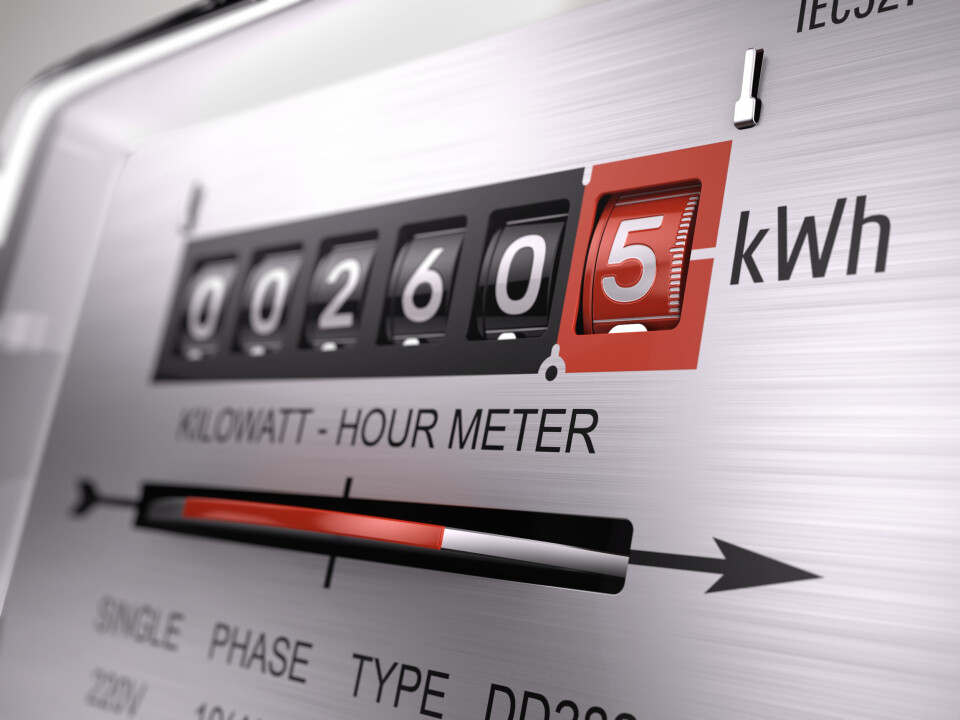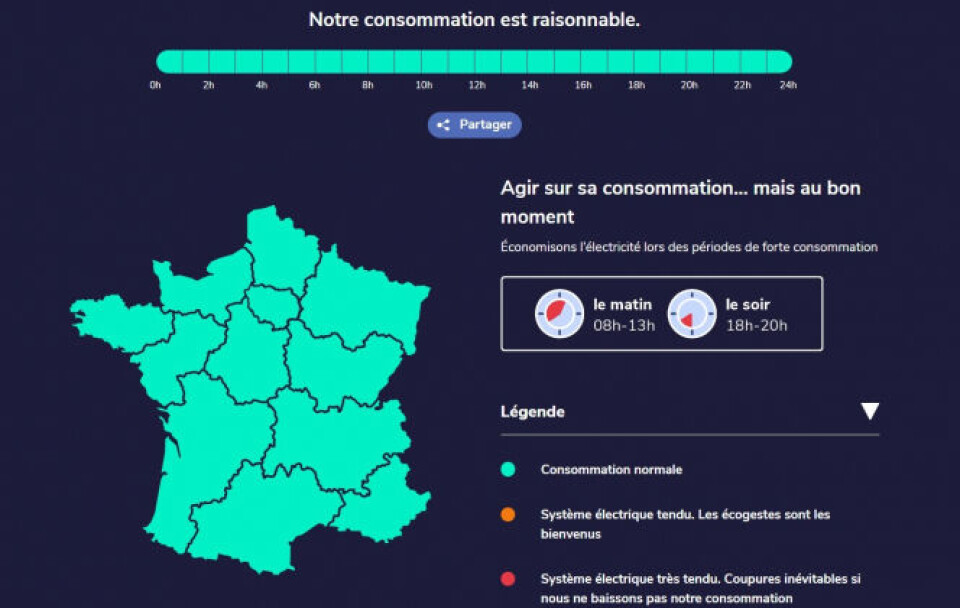-
Pistes closed, confinement orders: Alpine resorts deal with avalanche risk
Increased snowfall this weekend may cause further closures as busy school holiday season continues
-
Former French Interior Minister announces 2027 presidential candidacy
Bruno Retailleau recently asked prefectures to be tough on immigration
-
Ryanair axes Dublin-Rodez route but London connection retained
“We are disappointed but had no say in decision” say airport authorities
French TV news gives weather report-style electricity usage updates
France is planning a series of energy-saving measures to cope with possible electricity shortages this winter but has not ruled out the potential of power cuts

France Télévisions is now giving daily, weather report-style updates on the country’s electricity consumption as winter approaches and the government brings in energy-saving measures.
It broadcast its first update yesterday (October 3) at the end of its regular news bulletin.
It uses a service called EcoWatt to give a general view of how high the country’s electricity consumption is on the day.
It will class the country or regions of the country as being green – meaning normal electricity consumption – orange or red.
Orange means that the grid is under strain and people – primarily businesses with high energy consumption – should consider reducing their electricity use to help the situation.
Red means that the grid is under extreme pressure and power cuts are likely.
People can reduce their electricity consumption by, for example, not using dishwashers and washing machines or charging their phones during peak times, turning off lights that are not being used, avoid cooking meals that take several hours, etc.
Peak times are 08:00 to 13:00 and 18:00 to 20:00.
Read more: Tips for saving hundreds of euros on annual energy bills in France
These actions are described as écogestes in French. It should be noted that businesses, particularly large industrial businesses, are the prime target of calls to reduce consumption.
Individuals should not reduce their electricity usage to a point that could affect their health or wellbeing.
See EcoWatt’s list of écogestes at this link.
The image below shows EcoWatt’s provisions of France’s electricity consumption this morning (October 4).

Credit: Screenshot / EcoWatt
Read more: French energy firms offer up to €120 discount to those who cut usage
Read more: French residents save thousands on electricity by returning to EDF
Electricity cuts this winter
France is at risk of electricity shortages this winter due to a combination of factors, including the fact that over half of the country’s nuclear reactors are currently offline.
Twelve of the country’s 56 reactors have been offline for several years due to corrosion issues, while others are currently undergoing maintenance.
France gets 70% of its electricity from nuclear power.
President Emmanuel Macron warned in a speech on July 14 this year of the need to reduce energy consumption. The government is working on new energy saving measures that it is calling a plan de sobriété and which it should announce this Thursday (October 6).
The prime minister, Élisabeth Borne, has said that households will not be hit by gas cuts – another issue caused mostly by tensions with major supplier Russia – but the same is not guaranteed for electricity.
Read more: Gas cuts: how French firms and homes will or will not be affected
Read more: Regulated French gas and electric bills capped at 15% rise in 2023
A 1990 law in France states that electricity can be cut in households “when it appears that the power supply is likely to be compromised”.
Any cuts would not impact vital services such as hospitals, road traffic signals, security infrastructures, etc.
And power to households is to be cut, it will likely be a last resort.
If electricity demand is too high this winter, the government will first turn to large businesses of industrial size.
If demand is still too high then the Réseau de Transport d'Électricité (RTE), the electricity transmission system operator of France, will reduce the voltage of the entire French electricity network by 5%.
The impact will be almost imperceptible for households. For example, hobs will heat up a little less or light bulbs will be slightly less bright. The measure will save the equivalent of the electrical output of several nuclear reactors.
If demand is still too high, then RTE can put out a call for people to reduce their electricity consumption at peak times, meaning the mornings and evenings.
This would mean asking people to not run their dishwashers or washing machines or other less urgent electrical appliances at peak times.
If the winter is particularly cold then RTE could be forced into cutting households’ electricity in targeted areas for a period of no more than two hours.
RTE states that if the temperature drops by one degree celsius at winter time, electricity consumption increases by 2,400MW, the equivalent to the normal consumption of Paris.
If the worst comes to the worst, RTE could cut households' electricity in certain areas to stabilise the grid. This could be in cities or neighbourhoods of cities. If the cuts need to last longer than two hours then the next city or neighbourhood would have its electricity cut for at most two hours.
Again, vital services and buildings will not be affected. People who are receiving medical treatment at home could be affected by the cuts but they will be warned in advance.
The idea of these measures is to avoid wholescale, unexpected blackouts caused by the demand for electricity being too high.
RTE has stated that there is a risk of power cuts this winter but that risk is “controllable” thanks to planned energy-energy saving measures.
It is calling on individuals and businesses to attempt to reduce their consumption by one to five percent, or, in an extreme situation, 15%.
The government has asked people to heat their homes to a maximum of 19C this winter.
Related articles
Winter power cuts: What risk in France and why an app can help
Energy costs: French mayor buys pupils fleeces as heating drops to 19C
Energy costs: France’s mayors warn of risk to public services
























